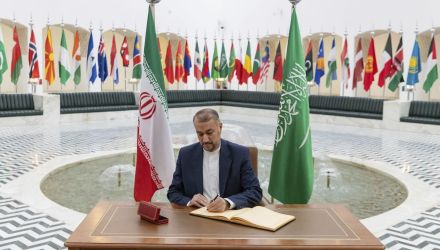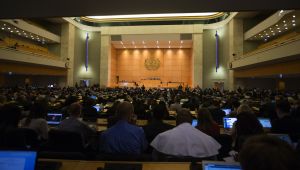The U.S.-Iranian diplomatic train is rolling fast, with President Hassan Rouhani talking Wednesday about a three-month timetable for a nuclear deal. But Rouhani was also cautiously insistent about staying on the single track of the nuclear issue — perhaps fearing that if this becomes a runaway, it will derail.
It was a careful Rouhani who sat down for a one-on-one interview, following a lengthy session with several dozen journalists and news executives. He appeared wary of using chits he may need in the negotiations or of complicating the diplomacy by raising issues of normalization, such as reopening embassies in Tehran and Washington.
Rouhani, wearing a white turban and his clerical robes, spoke slowly and deliberately; although he’s fluent in English, he used a translator. As in other recent interviews, he wanted to show a new, moderate Iranian face — speaking at length with the larger group of journalists, for example, of the “crimes” the Nazis committed against the Jews.
This is a man who wants to “make haste slowly,” as the Latin aphorism puts it. Here are some highlights from the interview:
●Rouhani stressed that he is “fully empowered to finalize the nuclear talks” by Iran’s supreme leader, Ali Khamenei, a claim confirmed by Western intelligence reports. Analysts say Khamenei was surprised and rebuffed by the popular wave of support for Rouhani’s moderate policies and has given him a chance to cut a deal.
●The Iranian president wants to move very quickly to resolve the nuclear issue, through negotiations. Rouhani said his “choice” would be a three-month timetable, and that six months would still be “good,” but this should be a matter of “months, not years.” The speedy timeline may reflect the pressure of sanctions on the Iranian economy or Rouhani’s fear of a political backlash from conservative rivals. Whatever the reason, the time is short.
●Rouhani said he was prepared to offer extensive “transparency” measures to reassure the West that Iran doesn’t intend to build a bomb. He likened these measures to what Iran allowed from 2003 to 2005,when he was the country’s chief negotiator, including acceptance of intrusive “additional protocols” from the International Atomic Energy Agency, as well as inspections to assess what the IAEA calls “possible military dimensions.”
●He didn’t discuss the level of uranium enrichment that Iran would adopt as part of a deal. But a knowledgeable Iranian source said this week that he might be willing to cap enrichment at 5 percent and limit Iran’s stockpile of enriched material; those moves would seek to address U.S. and Israeli worries about a future “breakout” capability.
●Rouhani said Iran wants to join a new round of Geneva negotiations for a political transition in Syria so long as there are no preconditions on Iranian participation. The Obama administration has tentatively decided to offer Iran a seat at these talks, reasoning that a stable political transition would be impossible if the Iranians weren’t a co-guarantor. He said that, in terms of a future government in Damascus, Iran would let Syrians decide at the ballot box; that’s the standard Iranian formula.
●He stressed his desire to first resolve the nuclear issue, where he has the most expertise and authority from Khamenei. After that, he said, the United States and Iran can discuss broader issues of normalization. “Once the nuclear file is settled, we can turn to other issues,” he said. “We need a beginning point.”
One of the most intriguing exchanges came when I asked Rouhani about his campaign statements that he wanted to reduce the power of security agencies such as the Revolutionary Guard Corps. He reaffirmed this goal of broadening cultural and social life and “diluting the security dimensions of society.” As for the Guard Corps, he said, “it shouldn’t get itself involved in any political groupings or activities,” echoing a similar statement a week ago by Khamenei. This is important because any real diplomatic breakthrough will be impossible unless Khamenei checks the Guard Corps’ power.
I asked Rouhani what he would have said if he had met with President Obama this week, as the United States had wanted. He offered a blandly upbeat statement that “we would have talked about opportunities and hopes.” But surely he avoided the Obama meeting because he knows he has limited time and scope and doesn’t want to make an early, over-enthusiastic mistake.
Ignatius, David. “Rouhani Sees Nuclear Deal In 3 Months.” The Washington Post, September 25, 2013




